We’ve been around the world and continue to expand our missions to new locations.
Children’s Surgery International (CSI) travels to areas where we have determined the need for our services to be great. To date, our volunteers have provided life-changing surgeries, in-country education and medical supplies for children, their families and medical professionals in 15 countries, and we continue to build new partnerships. Visit our photo and video gallery.
Ethiopia
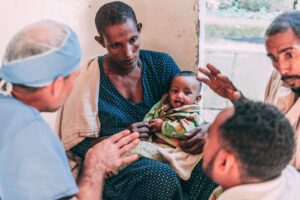
“The way you people work together, the way you are a team, the way you work together with our people, the way you help our people. It is a gift.” –Dr. Melesse Gebeyehu, Ethiopian surgeon.
CSI first traveled to Ethiopia in 2016 and our surgical teams continue with biannual trips. This trip was as unique and special as the country itself, thanks to a partnership with Dr. Woubeshet Ayenew, cardiologist at Hennepin County Medical Center (Minneapolis). CSI teams worked concurrently in two Ethiopian cities, performing craniofacial, urologic and cardiac surgeries and providing critical education, training and mentoring to local physicians, nurses and families. Dr. Ayenew led the cardiac team and was also instrumental to our overall success in making our traditional craniofacial and urologic surgical care connections and building lasting professional relationships. Learning of the significant need for craniofacial and urologic surgical care, our teams began to focus on these two specialties.
In 2023, after 8 years of collaboration, CSI and Bahir Dar University launched a Pediatric ENT and Facial Plastic Surgery Fellowship. This formal and accredited program will be the first of its kind in all of Ethiopia and the second in all of sub-Saharan Africa. Built on clinical care, teaching and research, this program willnot only create a future work force in Bahir Dar, but will make Bahir Dar University a national center of excellence for Pediatric ENT and Facial Plastic Surgery attracting surgical trainees from across the country. They will carry CSI’s legacy with them to hospitals across the country and into operating rooms that we may never see.
In addition to training for physicians, CSI nursing volunteers work side-by-side with Ethiopian nurses to teach them about feeding infants with clefts, as well as post-surgical care.
Liberia
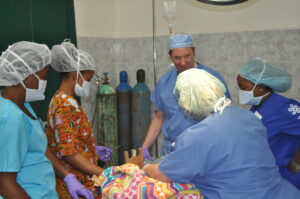
CSI’s first surgical trip to Liberia was in 2008. Ravaged by years of civil war, most of Liberia’s infrastructure had been destroyed and the need for medical care was great. Thanks to a close partnership with Firestone Natural Rubber, CSI surgical teams have been returning annually since 2010. Our teams are hosted at Firestone Hospital Duside, located on the Firestone rubber plantation.
CSI is committed to providing training and education for local personnel so they can continue to meet the needs of their community after we leave. In addition to surgical care and education, CSI has worked with Firestone to develop a large-scale community outreach initiative in Liberia. Our volunteer teams visit schools, orphanages, homes for seniors, and town halls to deliver food, supplies and healthcare.
Any given year, deworming medication is dispensed to more than 5,000 children and adults in the region. Rice, mattresses and clothing and school supplies are delivered to orphanages.
Mexico
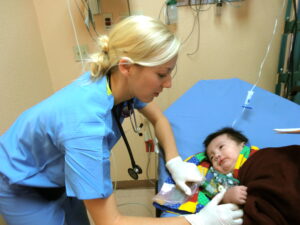
CSI volunteers have been traveling to Mexico annually since 2002. Together, with our trusted partners from St. Andrew’s Children’s Clinic, Hospital CIMA and Voluntariados, CSI is able to deliver comprehensive cleft care to children in the Sonora region of Mexico that meets or exceeds U.S. standards.
Every fall, CSI volunteerstravel to Hospital CIMA in Hermosillo, Mexico. Hospital CIMA and Voluntariados prepare year-round to host our team – ensuring the operating rooms, pre and post operative spaces and clinical staffing and supplies are in place for a busy surgical week. St. Andrew’s Children’s Clinic, located in Nogales, Arizona, provides free, specialized medical care to children living in Mexico who cannot get or afford the care they need in their home country. The team at St. Andrew’s, along with our partners at CIMA Voluntariados, is integral in identifying children from the Sonora region that could benefit from the robust cleft program that CSI has fostered over the years and assists the CSI team with essential pre-screening and ongoing patient follow-up.
Because of this unique partnership triad, CSI teams are able to follow children annually to evaluate their progress toward achieving more normalized speech, breathing, appearance and self-esteem. Between our visits, the children receive speech therapy and orthodontia care with St. Andrew’s Children’s Clinic.
The Gambia

In 2024, CSI completed their first surgical trip to The Gambia, the smallest country on mainland Africa and one of the poorest countries in the world. Here most families struggle to meet even the most basic human needs.
With 55% of The Gambia population under the age of 25, there is only one pediatric surgeon, Dr. Cherno Jallow, working at Edward Francis Small Teaching Hospital (EFSTH). Dr. Jallow has a waiting list of hundreds of children desperately in need of both craniofacial and urology surgery. EFSTH is the largest hospital in the country and home to the country’s only medical and nursing schools.
CSI’s ongoing goals for partnership include surgical training, supply support and sharing best practices for medical outreach programs.
Uganda
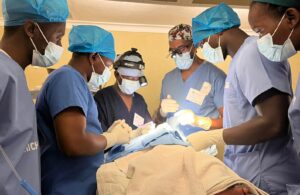
CSI collaborates with the surgical team at Holy Innocents Children’s Hospital in Mbarara, Uganda, to provide desperately needed care to children, and advanced training to their strong teams of surgeons, physicians, nurses, residents and medical students. Of the roughly 49 million people in Uganda, 50% are children. There are only ten pediatric surgeons in the country, only one of which provides care at Holy Innocents Children’s Hospital.
CSI Academic Director, Dr. Siva Chinnadurai, and his colleagues collaborate with our partners in Uganda through remote support to improve outcomes for Ugandan children in need of highly specialized treatment. This assistance includes connection to valuable resources, including medical and surgical case reviews, relevant literature and radiologist interpretations of scans performed locally. This remote support allows our Ugandan partners to effectively approach more complex cases and maintain their educational growth, even when we are not in the country.
Previous Partnerships
Bangladesh
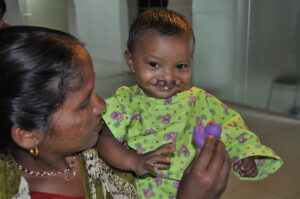
In 2010, Fazly Alahi, a native of Bangladesh living and working in Minnesota, contacted CSI. Fazly had a dream to make a connection between the United States and Bangladesh that could bring much-needed medical care and education to his home country.
CSI responded, sending experienced surgical team leaders to conduct site evaluations in northern Bangladesh. The hospital chosen is in the city of Rangpur, eight hours north of the capital, Dhaka.
CSI sent two surgical trips to Bangladesh. Many children have benefitted from surgical procedures, and significant education and training took place. CSI’s partnership with Fazly and his extended family, as well as the Rangpur Medical College, were crucial in providing essential supplies, transportation, translation and support to our team.
Ghana
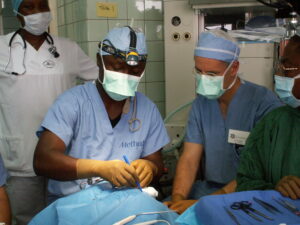
CSI surgical teams traveled to Ghana three times between 2004 and 2007. Surgeries included both craniofacial and orthopedic procedures and were performed at Komfo Anochi Hospital in Kumasi, Ghana. A robust partnership allowed extensive hands-on training and information exchange with our in-country colleagues.
As a result of the focus on surgical and medical care, as well as professional training, after the CSI’s third trip, our Ghanaian medical colleagues determined they had gained the skills and confidence needed to safely perform craniofacial and orthopedic surgeries and care independently.
Haiti
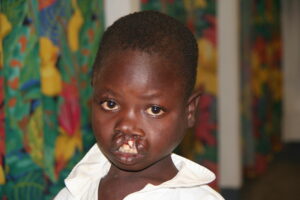
In light of the devastation caused by the Haiti earthquake in 2010, the CSI Board explored how they could help the children living there. Even prior to the earthquake, 50% did not survive past the age of five percent of children died before age five.
Shortly after the disaster, CSI contacted Fr. Rick Frechette, director of St. Damien’s Children’s Hospital in Port Au Prince, the only pediatric hospital in the country. Just months following the disaster, an eight-person medical team went to Haiti and performed 38 surgeries for children in dire need. CSI was privileged to return to Haiti two additional times the following year.
Peru
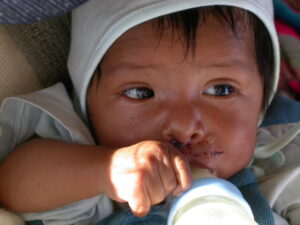
Peru was one of CSI’s early sites, with the first trip in 2003. Our surgical teams continued to travel there through 2009 and were able to serve more than 300 children. Surgeries included both craniofacial and general pediatric surgeries and were performed at Hospital Honorio Delgado in Arequipa, and Las Mercedes Hospital in Chiclayo.
Tanzania
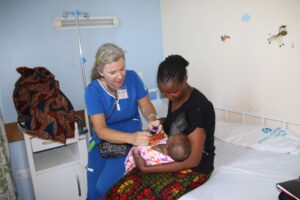
Children’s Surgery International (CSI) began traveling to Tanzania in the fall of 2018, partnering with Arusha Lutheran Medical Center (ALMC), a community and specialty hospital in the capital city.
CSI’s strong focus on education, training, and knowledge-sharing was a central part of our work in Tanzania. In addition to performing complex urology and craniofacial surgeries alongside local surgeons, CSI teams led medical lectures and provided life-saving Helping Babies Breathe training, taught by a CSI nurse educator.
Between 2018 and 2022, several successful surgical trips to Tanzania helped strengthen this collaboration and support the development of local pediatric surgical care.
Tunisia
In 2012, a team of eight CSI volunteers traveled to Tunis, Tunisia, to perform surgeries on children suffering from spina bifida. Families traveled from various parts of Tunisia, some traveling 1,000 miles, to seek help for their children.
The surgeries included correcting spinal defects and placing shunts to treat hydrocephalus. The CSI team worked closely with the staff at Souska Clinic, Dr. Azzedine Stombouli and Dr. Nejib Khouja. Dr. Khouja and his team were then able to continue this work after the CSI team returned to the United States.
Ukraine
CSI was proud to partner with International Medical Corps in 2023 to deliver emergency medical and mental health support to provide immediate, front-line aid to children and families in Ukraine.
Vietnam
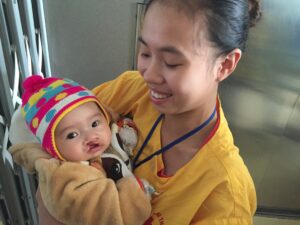
Thanh Hoa City, located along Vietnam’s Ma River, lies in one of the country’s poorest regions, known primarily for rice farming.
When CSI arrived for its first mission in 2015, we expected to screen around 70 children. Instead, more than 200 were waiting—thanks to the strong outreach efforts of our partner IPSAC, whose NGO status made it possible for CSI to expand our work to Vietnam.
The local hospital and its professionals were eager to collaborate and learn, and the need for specialized care in the region was clear. Many children received life-changing craniofacial and urology surgeries, and CSI ultimately returned for a total of four missions to the region.
Zambia
The COVID-19 pandemic in 2020 brought significant challenges—and unexpected opportunities. Through an online global health seminar, CSI had the privilege of connecting with new colleagues in Zambia. In collaboration with senior medical faculty at University Teaching Hospital in Lusaka, CSI delivered more than 25 virtual education sessions on a range of surgical topics in ENT, urology, and general pediatric surgery, reaching both medical students and hospital faculty.

